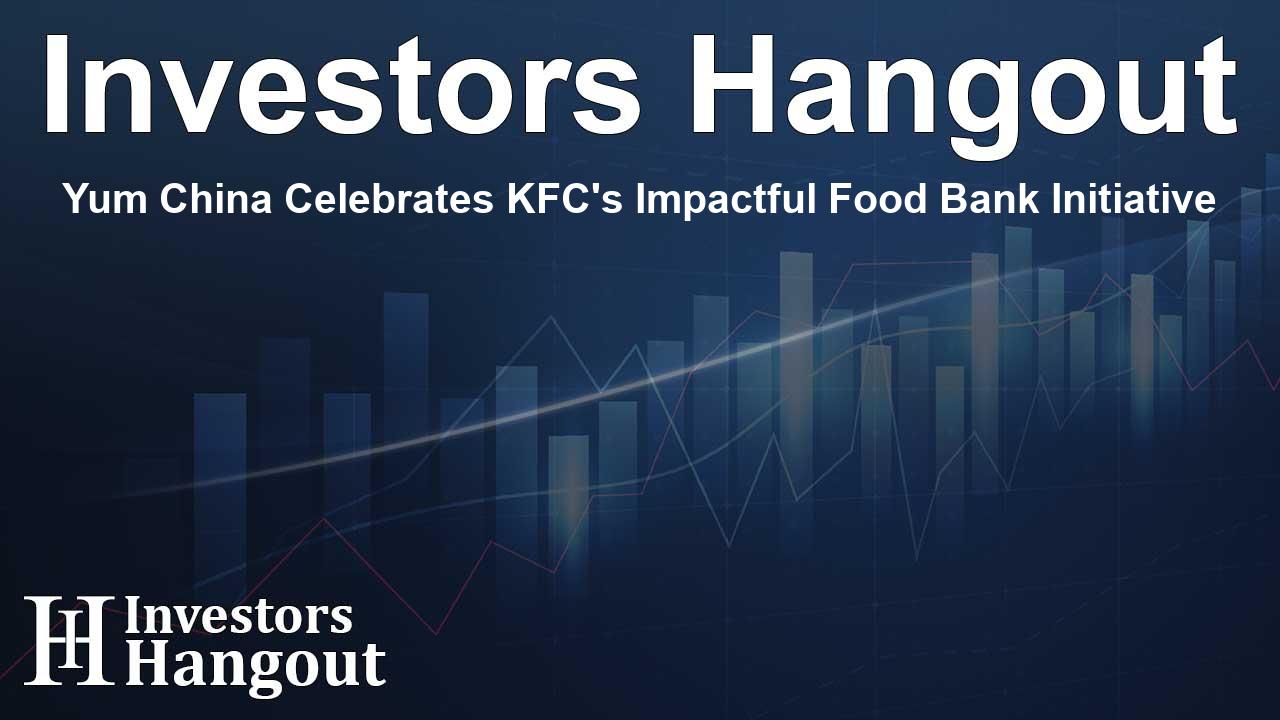Yum China Celebrates KFC's Impactful Food Bank Initiative

Yum China's KFC Food Bank Initiative Shines Bright
Yum China Holdings, Inc. (NYSE: YUMC) proudly announces that it has been recognized on Fortune's 2025 "Change the World" list. This prestigious recognition acknowledges companies that effectively integrate social impact initiatives into their core business strategies. Notably, Yum China's KFC Food Bank program has been spotlighted this year, illustrating its commitment to making a difference in society.
The KFC Food Bank initiative, which began its journey in 2020, has garnered widespread admiration. Initially launched in Shenzhen, it has successfully expanded to over 1,000 stations across more than 180 cities in the region. This impactful program provides community members in need with free surplus food that is still within its shelf life. By placing these stations near KFC outlets, the initiative effectively addresses food insecurity and significantly reduces waste.
This commitment to community service aligns perfectly with Yum China's broader sustainability objectives. As part of its mission, the company aims to reduce food waste per restaurant by 10% by the year 2030, using 2020 as a baseline for measurement. The Food Bank initiative is a testament to Yum China’s dedication to supporting local communities while addressing pressing social issues.
In addition to the KFC Food Bank program, Yum China supports rural education through its "One Yuan" Donation Program, which has now been active for 18 years. Since its inception in 2008, this program has raised over RMB 270 million, helped provide 59.6 million nutritious meals, and contributed to the construction of more than 1,500 modern kitchens in rural schools. These efforts underscore Yum China's continuous commitment to empowering the next generation and improving educational conditions.
Yum China is also channeling its efforts toward enhancing its sustainability practices. The company is actively working to decarbonize its operations, recycle waste materials, and implement sustainable alternatives wherever feasible. These initiatives are carried out without compromising on Food safety, which remains a top priority for the organization.
The annual "Change the World" list, now in its 11th year, is curated by Fortune editors based on thorough reporting and independent analysis. The main criteria for selection include measurable social impact, tangible business results, and innovation. Being named on this esteemed list twice underscores Yum China’s significant contributions to society.
More details on Yum China’s various sustainability efforts and initiatives can be accessed on their official sustainability webpage.
Yum China: A Leader in the Food Industry
Yum China is recognized as the largest restaurant company in China, driven by a mission to enrich lives through great tasting food. The company operates over 16,000 restaurants across six renowned brands, serving over 2,400 cities. KFC and Pizza Hut stand out as key players in the quick-service and casual dining sectors respectively.
Collaborative Ventures in China's Food Scene
In addition to its flagship brands, Yum China has partnered with Lavazza to introduce the Lavazza coffee experience to customers within the region. Furthermore, the company embraces a variety of culinary styles through its Little Sheep and Huang Ji Huang chains, which focus on traditional Chinese cuisine. Additionally, Taco Bell brings innovative, Mexican-inspired dishes to the table, expanding the palate of Chinese consumers.
Embracing Technology for Greater Efficiency
Yum China boasts a world-class, digital supply chain that involves an extensive network of logistics and in-house management systems. The company's robust digital capabilities are enhanced by a loyalty program, which not only accelerates customer engagement but also improves overall service delivery.
As a top 500 Fortune company, Yum China's vision extends beyond profitability; it strives to become an innovative leader in the restaurant industry, setting benchmarks in customer service and operational excellence.
Frequently Asked Questions
What is the KFC Food Bank Initiative?
The KFC Food Bank Initiative provides free, surplus food to community members in need through stations located near KFC outlets, promoting food security and waste reduction.
How does Yum China support rural education?
Yum China's "One Yuan" Donation Program has raised over RMB 270 million since 2008, funding nutritious meals and modern kitchens in rural schools.
Why was Yum China recognized by Fortune?
Yum China was recognized for integrating social impact initiatives, such as the KFC Food Bank, into its business strategy, showcasing measurable positive effects on society.
How does Yum China approach sustainability?
Yum China focuses on decarbonizing operations, recycling waste, and adopting sustainable alternatives, while prioritizing food safety across all its initiatives.
What are Yum China's key brands?
Yum China's key brands include KFC, Pizza Hut, Little Sheep, Huang Ji Huang, and Taco Bell, each offering a diverse range of cuisine to meet consumer needs.
About The Author
Contact Olivia Taylor privately here. Or send an email with ATTN: Olivia Taylor as the subject to contact@investorshangout.com.
About Investors Hangout
Investors Hangout is a leading online stock forum for financial discussion and learning, offering a wide range of free tools and resources. It draws in traders of all levels, who exchange market knowledge, investigate trading tactics, and keep an eye on industry developments in real time. Featuring financial articles, stock message boards, quotes, charts, company profiles, and live news updates. Through cooperative learning and a wealth of informational resources, it helps users from novices creating their first portfolios to experts honing their techniques. Join Investors Hangout today: https://investorshangout.com/
The content of this article is based on factual, publicly available information and does not represent legal, financial, or investment advice. Investors Hangout does not offer financial advice, and the author is not a licensed financial advisor. Consult a qualified advisor before making any financial or investment decisions based on this article. This article should not be considered advice to purchase, sell, or hold any securities or other investments. If any of the material provided here is inaccurate, please contact us for corrections.
